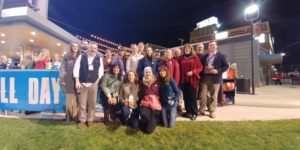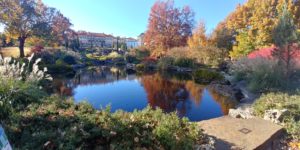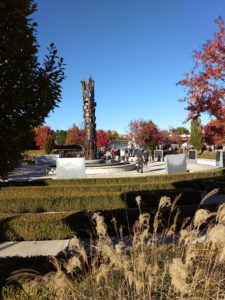 In November, two Urban Forestry team members, Alex Elias (Urban Forestry Grants Manager) and Ellen Clark (Urban Forestry Communications Specialist), attended the Partners in Community Forestry Conference in Tulsa, Oklahoma. The Partners in Community Forestry Conference is a two-day gathering for individuals, nation-wide from industry, non-profit, and state, local and federal agencies alike to come together and collaborate and share ideas, research and interests with others. The conference offered peer-to-peer learning opportunities and educational sessions regarding how to engage communities and partners to promote trees. The conference also fostered discussions regarding how to develop nationwide metrics and stories promoting urban forestry.
In November, two Urban Forestry team members, Alex Elias (Urban Forestry Grants Manager) and Ellen Clark (Urban Forestry Communications Specialist), attended the Partners in Community Forestry Conference in Tulsa, Oklahoma. The Partners in Community Forestry Conference is a two-day gathering for individuals, nation-wide from industry, non-profit, and state, local and federal agencies alike to come together and collaborate and share ideas, research and interests with others. The conference offered peer-to-peer learning opportunities and educational sessions regarding how to engage communities and partners to promote trees. The conference also fostered discussions regarding how to develop nationwide metrics and stories promoting urban forestry.
The benefits of these meetings and conferences to Wisconsin were numerous. Ellen and Alex attended sessions covering the topics of storm water management, writing urban forest management plans, benefits to human health, increasing volunteers and advocacy, energy reduction techniques and many more. These sessions provided a greater understanding of innovative, successful, and replicable national, regional and state initiatives that can be used to strengthen our program delivery at all levels. This relates directly to the Division’s Strategic Direction objective to support public and private partnerships to increase their capacity and investment in the urban forest canopy.
 A highlight of Ellen’s was a tour of “A Gathering Place for Tulsa,” a local $350 million, nearly 100 acre park along the Arkansas River. This tour took her through the current construction site where several different buildings and individual, smaller parks and waterways were being built. Additionally, Ellen really enjoyed and will bring back to the team information that she learned from a session on the human health benefits trees supply. There were four different speakers that presented on their research, various marketing campaigns, and different case studies surrounding the health benefits urban and community forestry. One piece of research that was highlighted in this session was the correlation between the cost of healthcare and urban forests.
A highlight of Ellen’s was a tour of “A Gathering Place for Tulsa,” a local $350 million, nearly 100 acre park along the Arkansas River. This tour took her through the current construction site where several different buildings and individual, smaller parks and waterways were being built. Additionally, Ellen really enjoyed and will bring back to the team information that she learned from a session on the human health benefits trees supply. There were four different speakers that presented on their research, various marketing campaigns, and different case studies surrounding the health benefits urban and community forestry. One piece of research that was highlighted in this session was the correlation between the cost of healthcare and urban forests.
 Alex’s favorite session focused on planting trees on private property in Gateway Cities in Massechusetts to reduce energy use in high density, low tree canopy, low income neighborhoods. The Massachusetts Office of Energy and Enviromental Affairs developed the initiative and partnered with community groups, other government agencies, and universities to plant over 10,000 trees in 14 cities and create 150 seasonal jobs in 4 years. Alex enjoyed learning more about such a successful program and it reaffirmed the importance of making connections with community members.
Alex’s favorite session focused on planting trees on private property in Gateway Cities in Massechusetts to reduce energy use in high density, low tree canopy, low income neighborhoods. The Massachusetts Office of Energy and Enviromental Affairs developed the initiative and partnered with community groups, other government agencies, and universities to plant over 10,000 trees in 14 cities and create 150 seasonal jobs in 4 years. Alex enjoyed learning more about such a successful program and it reaffirmed the importance of making connections with community members.
As a result of attending these meetings and conferences, both Ellen and Alex are better positioned to interact with counterparts from other states, USFS staff, participate in regional planning initiatives, and help develop/build partnerships. Additional knowledge was gained through discussing national and regional policies with state counterparts resulting in a broader urban forestry policy perspective.
For more information contact Ellen Clark, Urban Forestry Communication Specialist, via email (EllenA.Clark@wisconsin.gov).
